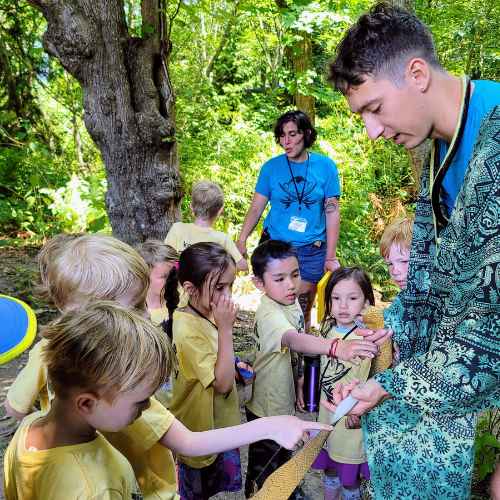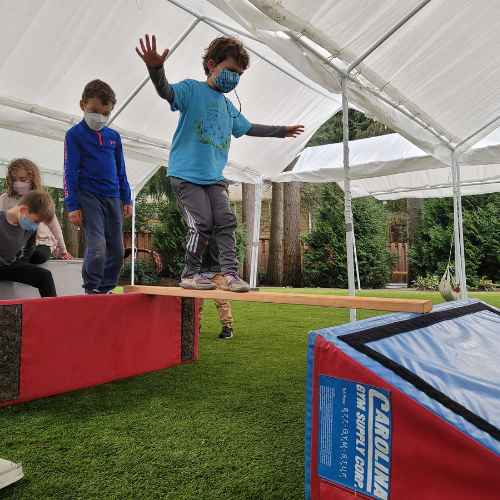
We all want the best for our little ones, and one of the most heartwarming sights is seeing them surrounded by friends, giggling, and having a blast. But what happens when your child struggles with social awkwardness, making those friendship-building moments a bit challenging? Don’t worry; you’re not alone in this concern.
In the age of online connections and digital distractions, parents are rightfully worried about their kids missing out on the essential skill of making friends. So today, let’s help kids with social awkwardness explore how play, games, and aligned activities can make the process of “making a friend” a whole lot easier.
Understanding Social Awkwardness
Social awkwardness is a common phase of childhood and adolescence, and it’s essential to recognize and understand it. It typically manifests as shyness, nervousness, or difficulty in social situations. Here are some key points to keep in mind:
- Normal Development: It’s important to know that social awkwardness is a normal part of development. Many children go through this phase as they learn to navigate the complexities of social interactions.
- Variability: Social awkwardness can vary from child to child. Some may be naturally more introverted or reserved, while others may struggle more with social situations.
- Causes: It can be caused by various factors, including a lack of social exposure, anxiety, or a strong focus on individual interests or hobbies.
- Temporary Phase: For many children, social awkwardness is a temporary phase that they outgrow with time and support.
- Unique Individuals: Remember that each child is unique. What works for one may not work for another, so it’s essential to tailor your approach to your child’s specific needs and personality.
The Importance of Friendship-Making Skills
Friendships are like the heartbeats of childhood. They’re not just about playmates; they’re a fundamental part of your child’s growth and development. Here’s why fostering friendship-making skills is so crucial:
- Empathy and Compassion: Through friendships, children learn to understand and empathize with others’ feelings. They discover the value of kindness and compassion.
- Cooperation and Teamwork: Friendships often involve collaboration and teamwork. Kids learn how to work together, compromise, and achieve common goals.
- Communication: Effective communication is a cornerstone of friendships. Kids practice expressing themselves, listening actively, and resolving conflicts peacefully.
- Building Confidence: Successful friendships boost a child’s self-esteem and self-confidence. Knowing they can make and maintain friends gives them a sense of accomplishment.
- Life Skills: The skills acquired in friendships are life skills. They extend beyond the playground and are essential for future success in relationships, school, and work.
The Role of Play and Games In Making Friendships
Play and games are like magic wands for children. They create structured yet enjoyable environments where kids can interact, share, and learn. Here’s why play offers such a pivotal role in helping children overcome social awkwardness:
1. Structured Interaction
Games provide a clear structure for interaction, making it easier for kids to engage with their peers. Rules and objectives guide the play, reducing uncertainty.
2. Practice in Communication
In the world of games, kids practice communication skills. Whether it’s discussing strategy, making decisions, or negotiating, they’re constantly communicating.
3. Turn-Taking and Sharing
Games teach the importance of taking turns and sharing. These are fundamental social skills that are crucial for building friendships.
4. Problem-Solving
Many games such as Egypt Pyramid Adventure involve problem-solving, encouraging kids to think critically and work together to find solutions. This mirrors real-life social situations.
5. Fun and Engagement
The joy and engagement that come with play and games can boost a child’s confidence and willingness to participate in social activities.
Board Games and Cooperative Play
Board games and cooperative play teach social skills and help children overcome social awkwardness. Here’s why they can be incredibly beneficial:
- Board games provide structured social interaction. The rules and objectives of the game guide how children interact with each other, reducing the uncertainty of social encounters.
- Many board games require taking turns and patience. Children learn the importance of waiting for their turn and respecting others’ opportunities.
- Board games encourage communication. Kids discuss strategies, make decisions, and negotiate with their peers during the game, improving their ability to express themselves.
- Several board games involve problem-solving. Children work together to find solutions, fostering teamwork and critical thinking.
- Board games make learning social skills enjoyable. Kids have fun while developing important abilities they can use in real-life social situations.
Whether it’s classic games like Monopoly, cooperative games like Pandemic, or educational games like Scrabble, board games offer a diverse range of options to suit your child’s interests and needs. They create a comfortable and engaging space for practicing social skills and making new friends.
Role-Playing Games
Role-playing games (RPGs) aren’t just for the realm of fantasy; they can also be powerful tools to help your child overcome social awkwardness and build valuable social skills.
- RPGs provide a safe and imaginative space for children to explore different social scenarios. They can take on various roles, experiment with different personalities, and practice social interactions without fear of real-life consequences.
- Role-playing requires children to step into someone else’s shoes. This fosters empathy and helps them better understand the perspectives and feelings of others.
- In RPGs, kids engage in conversations, negotiations, and decision-making, all of which are essential components of making friends. They learn how to express themselves and listen actively.
- RPGs often involve resolving conflicts within the game’s storyline. This teaches kids how to handle disagreements and find peaceful solutions, valuable skills for building and maintaining friendships.
- Role-playing encourages creativity and imagination. It’s a world where your child can let their imagination run wild, fostering a sense of playfulness and curiosity.
Whether it’s playing pretend as characters from a favorite book or engaging in tabletop role-playing games, these experiences can be both fun and educational. These supportive and creative environments help children practice social skills and overcome social awkwardness.
Outdoor Play and Learning
Outdoor play is a natural classroom for overcoming social awkwardness:
- The outdoors presents real-world challenges that require problem-solving and teamwork. Climbing a tree, building a fort, or exploring nature can be great opportunities for kids to work together and bond.
- Outdoor play often involves physical activity, releasing endorphins that boost mood and confidence. It’s an excellent way for kids to feel comfortable in their bodies, which can translate to social confidence.
- Outdoor play allows for unstructured activities. Kids can invent their games and rules, fostering creativity and decision-making.
- Outdoor play involves a certain level of risk-taking, which can be positive when managed safely. It helps children build resilience and confidence by trying new activities and overcoming fears.
Encouraging your child to spend time outdoors, whether it’s at the park, in the backyard, or on a nature hike, can be a fantastic way to support their social development.
Team Sports and Clubs
Participation in team sports and clubs can be a game-changer for children struggling with social awkwardness:
- Team sports and clubs bring kids together who share common interests. This common ground provides an excellent starting point for making friends and initiating conversations.
- These activities come with structured social interactions during practices, games, or club meetings. This can help children with social awkwardness feel more at ease, as they know what to expect.
- Team sports and clubs emphasize cooperation and teamwork. Kids learn to work together, communicate effectively, and support one another in achieving common goals.
- Being part of a team or club gives children a sense of belonging. They feel like they are part of a community, which can boost self-esteem and social confidence.
- In these settings, children may have opportunities to take on leadership roles or responsibilities. This can be a confidence booster and help them develop valuable leadership skills.
Whether it’s soccer, basketball, scouting, or drama club, these activities offer various options to suit your child’s interests. They provide a structured yet enjoyable way for children to practice social skills, and build friendships.
Implementing Game-Based Learning at Home and School
- Align with Learning Objectives: Choose games that align with developmental goals and social awareness objectives. Look for games that explicitly promote teamwork, communication, and problem-solving.
- Family Interaction: Encourage learning through family interaction and game nights. Create a regular schedule for family game time where everyone can participate and bond.
- Age-Appropriate Choices: Select games that match your child’s interests and developmental needs. Ensure that the complexity of the game is suitable for their age and skill level.
- Educational Resources: Explore educational resources that provide guidance on incorporating game-based learning. There are many books, websites, and courses available for parents and educators.
- School Collaboration: If possible, collaborate with your child’s school to introduce game-based learning into the curriculum. Share your insights and experiences with teachers and administrators to promote its benefits.
Challenges and Solutions Parent’s Often Face At Home
While game-based learning is incredibly beneficial, it’s essential to be aware of potential challenges and have solutions in mind to overcome them. Here are some common challenges and how to address them:
Challenge #1 Resistance – Some children may initially resist the idea of incorporating games into their learning routine.
Solution- Start with games that align with their interests, gradually introducing educational elements.
Challenge #2 Screen Time Concerns – Digital games can raise concerns about excessive screen time.
Solution: Set clear limits on screen time and balance digital games with physical activities.
Challenge #3 Competitiveness – Competitive games may lead to conflicts among children.
Solution – Choose cooperative games that emphasize teamwork and encourage fair play.
Challenge #4 Accessibility – Not all children have equal access to technology or board games.
Solution – Encourage the use of educational games at school and explore community resources or libraries for game borrowing.
Challenge #5 Consistency – Maintaining a consistent game-based learning routine can be a challenge.
Solution – Create a schedule or calendar for game-based learning sessions to ensure regularity.
Engage with Our Programs
We invite you to explore our after school and summer camp programs, specially crafted to nurture social awareness through games and play. Our community is a supportive space for parents, caregivers, and educators to share experiences, gain valuable insights, and access resources that empower children to thrive in the world of friendships.
In the world of childhood, friendships are the currency of happiness. As a parent or caregiver, always remember that you play a vital role in helping children develop the social skills they need to build lasting connections. Social awkwardness is a challenge, but it’s not a roadblock.
GET Access to the ULTIMATE PLAY DATE PACKAGE (value: $49) for FREE!



